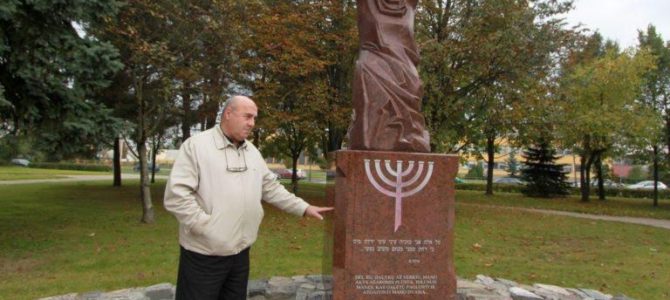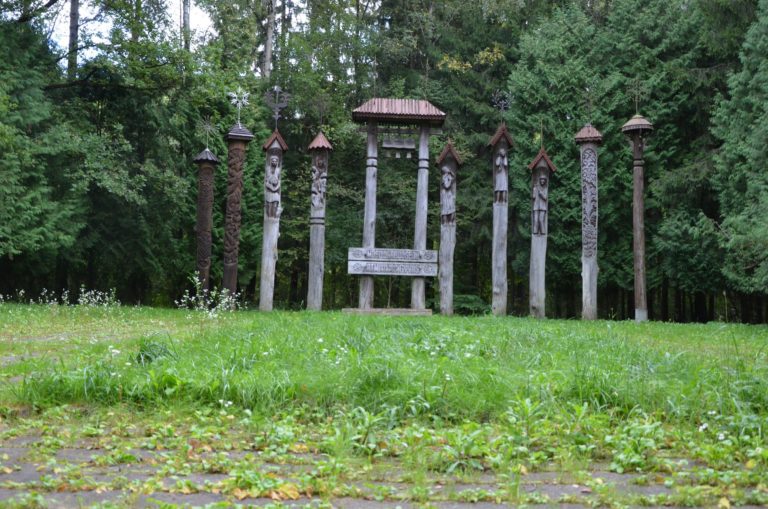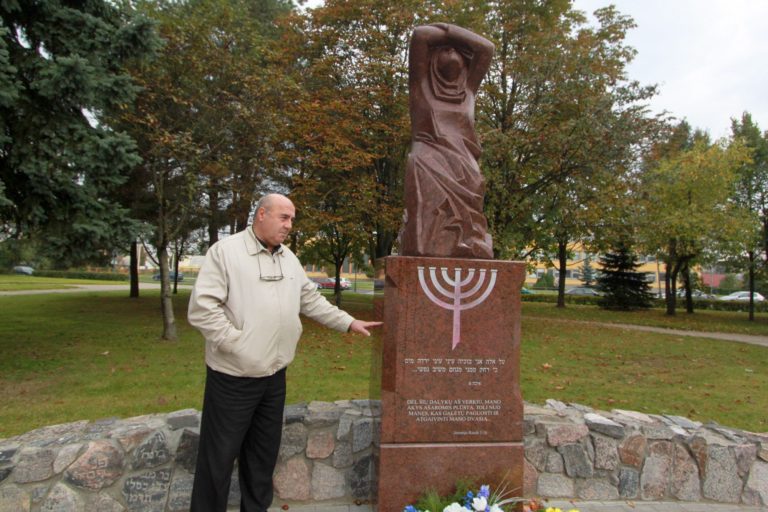
Every year the Panevėžys Jewish Community writes the municipal and regional administrations regarding the most tragic sites in Jewish history, sites which need continual upkeep and maintenance, the Jewish mass murder sties in the city, district and region of Panevėžys. And also in other towns such as Kupiškis, Pasvalys, Biržai, and smaller towns such as Krekenava, Pumpėnai, Raguva, Obeliai, Ramygala, Vabalninkas and others.
A large number of municipal and regional administrations consider all our requests in a spirit of goodwill and are engaged in solving the problem of maintenance at these places of tragedy, but, unfortunately, there are also a number of administrations who discover all sorts of reasons not to fulfill our requests. We believe there needs to be a common stance by government so that every year, especially in summer, cemeteries and the mass murder and mass grave sites are mowed and cleaned up. The municipal bodies of the towns of Kupiškis and Rokiškis are paying attention to the problem, while we have to beg and cajole the Pasvalys administration constantly to maintain and clean up the mass murder site in the Žadeikiai Forest there. The Jewish cemeteries in Krekenava and Raguva are in extremely bad repair.
The Sekundė newspaper in Panevėžys has published an article on the current state of affairs which might be of interest to our readers as well:
Mess Causing Embarrassment
by Daiva Savickienė
Photographs by Austėja Bankauskaitė
A sagging wooden bench, uncut grass and weeds coming up abundantly through the paving stones, a layer of shards of broken bottles with no place to put your foot—this is the scene which would greet an Israeli delegation visiting Panevėžys were they to visit the mass murder site in Kaizerlingas woods. Who is in charge of maintaining the memorial?

If visitors ever got the idea of visiting the memorial in the Kaizerlingas woods, the city municipality would be filled with red faces, officials embarrassed by the mess. Photo by A. Bankauskaitė.
This abandonment of duty by the municipality and their and lack of respect for the people murdered is angering residents who still remember well hearing in their younger days the sounds of gunfire, when they were forced to hide their heads under their pillows. In July of 1941 one-hundred and three people were shot to death, 70 of whom were Jews and the remaining 33 Lithuanians and Russians, in the Kaizerlingas woods, which is also called the Staniūnai woods. Panevėžys Jewish Community chairman Gennady Kofman says according to Lithuanian law it’s the job of the municipalities to all mass murder sites and cemeteries, without regard to whether the dead were Lithuanian, Jewish or some other ethnicity. He says the city government knows perfectly well of the problem and he spoke with deputy mayor Petras Locmanas about cleaning up the Kaizerlingas memorial at the end of July.
“The Panevėžys Jewish Community cannot cover 34 locations. Someone calls us from Kupiškis, for instance, and ask us to come and visit four locations, someone calls from Rokiškis with the same request. We wrote a group letter to all the municipalities reminding them under Lithuanian law they are charged with maintaining all such sites,” Kofman told Sekundė newspaper.
Sometimes the Community together with students travels on its own to clean up mass murder sites, but isn’t able to do that every month, the local Jewish Community is just too small.
Fence Needed
Kofman said the old Jewish cemetery on Vasario 16-osios street is being maintained very well, the grass is cut regularly, trash is collected and it is cared for. The square there has been renamed as well to Memorial Square. Although the Kaizerlingas woods site is more distant, it is the more frequent destination of visitors.
“The Kaizerlingas woods memorial is situated not exactly where the 103 people were shot. Who was shot? Mainly Jews, several Lithuanians, and Russians. The site is in a sorry state, and it doesn’t matter to whom it belongs, it needs to be maintained,” Kofman said, adding that the memorial’s location away from the actual killing site poses problems.
The local Jewish community chairman said the real mass murder site is known to be further on, but it’s impossible to discover its exact location now because of dense vegetation.
Kofman visited the site two weeks ago and says there’s plenty of work to do there, and perhaps a formal project needs to be launched to put the entire memorial territory in order. Tasks including clearing brush, renewing inscriptions, doing something about the dilapidated bench and replacing the fence which formerly stood around the memorial.
“I understand perfectly well the municipality lacks funds, but a fence still needs to be set up there,” he said.
He said there are sites in worse disrepair, and cited the mass murder site in the Žadeikiai Forest near Pasvalys as an example. The Jewish cemetery in Krekenava which many visitors visit is also in a very poor state.
Lack of Respect
Kofman says the broken bottles littering the memorial are nothing new. He doesn’t call it vandalism, but rather a lack of culture among the people. He said at least now automobile traffic has been stopped at the site. But people continue to walk their dogs at the old Jewish cemetery on Memorial Square.
“You bring guests here, and they’re walking dogs,” Kofman said, and wants taking dogs out to do their business at such locations banned.
Residents living nearby bring their grass-cuttings and yard litter to dump at the square.
Recently the Jewish community has noted an increase in intentional vandalism. In one instance the memorial state on the square, “Sad Jewish Mother,” served as the target for people throwing rocks. Estimates put the cost of repair at several hundred euros. There are fears the statue might be the target of further attacks and that it will have to be entirely replaced, at great expense.

Panevėžys Jewish Community chairman Gennady Kofman says they’re encountering vandalism and the statue “Sad Jewish Mother” isn’t suffering for the first time. Photo: Sekundė archive
“This is an act of vandalism. If the perpetrator is discovered, he will be punished severely,” Kofman said.
Promises of Maintenance
Sigitas Vainauskas, a manager at the Panevėžys Special Automobile Transportation enterprise, says a special directive by the city municipality is issued for cleaning up the area of the Kaizerlingas woods next to the memorial. If they receive that directive, they cut the grass and carry away the clippings, and collect the trash. He says he doesn’t remember the last time exactly when they cleaned up the area, but it was probably in late June or early July.
Panevėžys deputy mayor Petras Locmanas said the plot of land where the memorial is located is state property, entrusted to Forests Maintenance, and that they are trying to change the ownership so they can clean it up. Of course, the ownership question doesn’t prevent anyone from cleaning up the site.
“I stressed this to the administration earlier, but it seems I will have to remind them again so the territory would be cleaned up as much possible,” the deputy mayor told Sekundė newspaper.
He said people sometimes go to such sites to spend time and out of ignorance or apathy leave garbage and break bottles.
“We need to look at the problem as one of housekeeping. We don’t need to clean up every day, but we do need to pay attention to sites where there are cemeteries,” Locmanas said.
Different as Night and Day
The mass murder site in Žalioji Forest looks totally different. New firs have been planted here, flowers are blooming, the grass was cut recently and there is no trash.
Karsakiškis alderwoman Rima Jaškūnienė says there are no scheduled clean-ups. They simply go there occasionally and clean it up, because the memorial is near a highway and people driving by often throw garbage out their car windows. It was also cleaned up in the run-up to September 23 [Lithuanian Jewish Genocide Remembrance Day].
The alderwoman says it isn’t always a simple thing to organize clean-ups because there is a lack of people to do outdoor work. “This year we barely had time. We had to make do with cutting the grass twice, but much more needed to be done,” the alderwoman said.
Full story in Lithuanian with photo gallery here.

